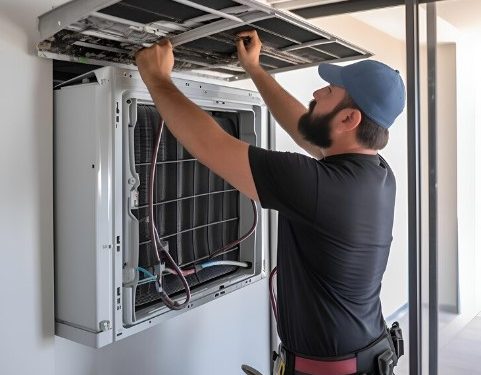If you’re a homeowner in London, you’re likely familiar with the struggle of keeping your home warm during the colder months. With temperatures dropping, many people turn to their central heating systems for warmth. However, outdated or inefficient systems can result in high energy bills and poor heating performance. This is where central heating upgrades come in, offering a solution to improve efficiency and save money in the long run.
Upgrading your central heating system can involve a range of improvements, from replacing old boilers and radiators to installing smart thermostats and insulation. Not only can these upgrades increase the overall efficiency of your heating system, but they can also contribute to a more sustainable and environmentally friendly home. With London’s commitment to reducing carbon emissions, improving your home’s heating efficiency is a step in the right direction. In this article, we’ll explore the benefits of central heating upgrades and how they can improve the comfort and energy efficiency of your London home. For more information on central heating upgrades,click here.
Assessing Current Heating Systems
When it comes to enhancing heating efficiency in your London home, the first step is to assess your current heating system. This will help you identify areas for improvement and determine whether modernizing your heating system is necessary.
Evaluating Existing Efficiency
To evaluate the efficiency of your current heating system, you should consider factors such as the age of the system, the type of fuel it uses, and the size and layout of your home. An older heating system may be less efficient than a newer one, and a system that runs on oil or gas may be less efficient than one that uses electricity. Additionally, if your home has undergone any renovations or additions since the heating system was installed, it may no longer be the right size to adequately heat your entire home.
You can also evaluate the efficiency of your current heating system by looking at your energy bills. If your bills have been steadily increasing over time, this may be a sign that your heating system is not operating as efficiently as it could be.
Identifying Areas for Improvement
Once you have evaluated the efficiency of your current heating system, you can begin to identify areas for improvement. This may include upgrading to a newer, more efficient heating system, or making smaller changes such as improving insulation or replacing outdated thermostats.
Some common upgrades that can improve heating efficiency include installing a programmable thermostat, upgrading to a high-efficiency furnace or boiler, and adding zone controls to your heating system. Additionally, improving insulation in your home can help to reduce heat loss and improve overall efficiency.
Overall, assessing your current heating system is a crucial first step in improving heating efficiency in your London home. By evaluating existing efficiency and identifying areas for improvement, you can make informed decisions about modernizing your heating system and reducing your energy bills.
Implementing Heating Upgrades
If you’re looking to improve the efficiency of your central heating system, there are a variety of heating upgrades you can implement in your London home. In this section, we’ll discuss two key areas to focus on: choosing eco-friendly options and installation best practices.
Choosing Eco-Friendly Options
Upgrading to eco-friendly heating is a great way to reduce your carbon footprint and save money on your energy bills. One option to consider is installing a heat pump, which uses renewable energy from the air or ground to heat your home. Another option is a biomass boiler, which burns wood pellets or logs to provide heat.
When choosing an eco-friendly heating option, it’s important to consider the upfront costs as well as the long-term savings. You may also be eligible for government incentives or grants to help offset the cost of installation.
Installation Best Practices
Once you’ve chosen your heating upgrade, it’s important to ensure that it’s installed correctly to maximize its efficiency. Here are some best practices to keep in mind:
- Hire a qualified heating engineer to install your new system.
- Make sure your new system is properly sized for your home.
- Consider upgrading your insulation to further improve energy efficiency.
- Regularly maintain your system to ensure it continues to operate efficiently.
By implementing these heating upgrades and best practices, you can improve the efficiency of your central heating system and reduce your carbon footprint.
Frequently Asked QuestionsWhat steps can be taken to enhance the efficiency of an existing central heating system?
There are several steps you can take to enhance the efficiency of your existing central heating system. One of the easiest and most effective ways is to upgrade your boiler to a newer, more efficient model. You can also install smart thermostats, which allow you to control your heating remotely and adjust the temperature based on your schedule. Additionally, you can improve the insulation in your home to reduce heat loss and make your heating system more efficient.
What are the most cost-effective central heating improvements for London homes?
The most cost-effective central heating improvements for London homes include upgrading your boiler to a more efficient model, installing smart thermostats, and improving the insulation in your home. These upgrades can significantly reduce your energy bills and improve the overall comfort of your home.
How does the Warmer Homes Grant Scheme assist London residents with heating efficiency?
The Warmer Homes Grant Scheme provides financial assistance to London residents who need to upgrade their heating systems or improve the insulation in their homes. The scheme offers grants of up to £10,000 to eligible homeowners and landlords to cover the cost of upgrading their heating systems or improving their home insulation.
What heating systems are known for being the most energy-efficient in UK residences?
The most energy-efficient heating systems in UK residences are those that use renewable energy sources, such as solar panels or ground source heat pumps. These systems can be more expensive to install initially, but they can significantly reduce your energy bills over time and are better for the environment.
What are common mistakes to avoid when upgrading home heating systems for better efficiency?
One common mistake to avoid when upgrading your home heating system is choosing a system that is too large or too small for your home. It’s important to choose a system that is the right size for your home to ensure that it operates efficiently. Another mistake to avoid is failing to properly maintain your heating system. Regular maintenance can help keep your system running efficiently and prevent costly repairs.
How does insulation contribute to the overall efficiency of central heating in UK homes?
Insulation helps to reduce heat loss in your home, which means that your heating system doesn’t have to work as hard to maintain a comfortable temperature. This can significantly improve the efficiency of your central heating system and reduce your energy bills. Proper insulation can also help to reduce noise pollution and improve the overall comfort of your home.
For a comprehensive guide on improving the efficiency of central heating systems in London homes, the “Help and advice for heating your home” section on Energy Saving Trust offers detailed insights. They provide valuable tips and best practices for upgrading your central heating system, contributing to a more sustainable and energy-efficient home.














